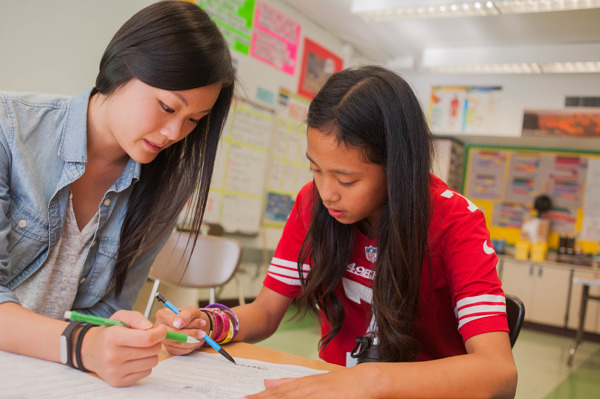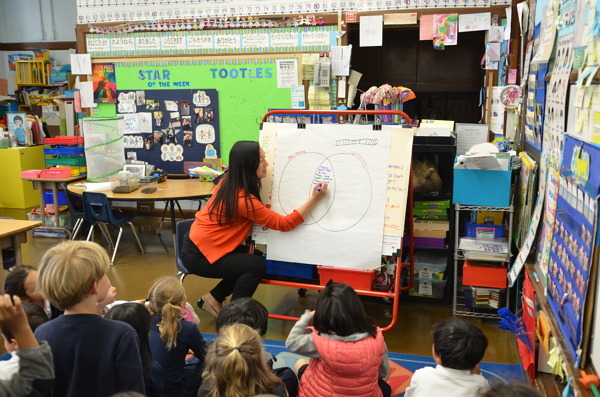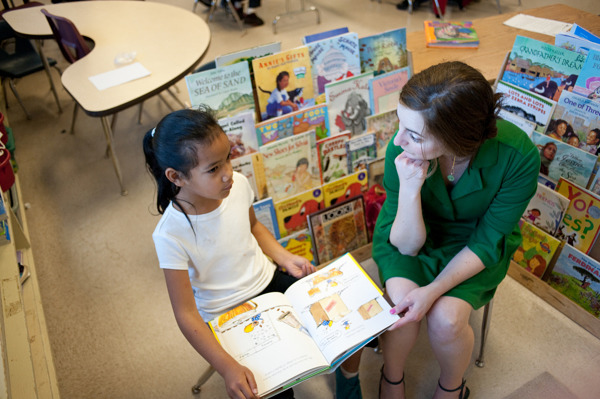It’s easy to become pessimistic about the state of the world and the divides in our communities. One of the best antidotes to despair, however, is taking action.
Many public schools, especially schools that are underfunded and understaffed, need members of the community to help. Volunteer tutors and mentors can spark a love of reading or STEM (science, technology, engineering and math) in a young student, help a high schooler navigate the college application process or assist a teacher in a busy classroom. Whatever skills or experiences you have, you can bet they’re in demand in public education. On the fence about volunteering? Here are five reasons to start.
- You can play a direct role in improving your community

By volunteering to work with children as they learn to read, improve their math skills or prepare for college, you play a part in helping your community become better educated.
Just by showing up, you make a difference. This study found that the higher the adult-to-youth ratio in a given community, the better children are likely to fare in life. In particular, a 1% increase in adults in a community is associated with a 1% decrease in the rate of kids leaving school. What’s more, studies show that children who grow up with mentors are more likely to want to become mentors themselves, and people who are more educated are more likely to give back to their own communities by volunteering. By volunteering, you can help start a positive cycle of community-building that outlasts your immediate work.
- You can fit it into your busy schedule, because it takes just one hour a week to make a difference.
While educators appreciate all of the time volunteers can possibly give, just dedicating one hour a week goes a long way. Volunteers can spend that time as tutors, mentors or classroom assistants during the school day. Even with a full-time job and a busy day, you can make an impact by heading to school before or after work or during a lunch break. You might also find that spending time with children and teachers provides a welcome escape from the workday grind.
“For years, every time I entered the third grade classroom, everyone cheered,” said George Cruys, who works at Wells Fargo and volunteers at the Chinese Education Center Elementary School near his office. “Volunteering is the only place in my life where I’ve gotten that kind of reception on a consistent basis.”
- Teachers might be superheroes, but it’s tough to save the world alone

Teachers work incredibly hard to educate each of their students, but when they’re tasked with instructing a class of up 30 kids, their mission can be daunting. Every year the San Francisco Education Fund receives more volunteer requests from teachers than we can fill. By volunteering, you can help change that.
Volunteers can support teachers in their classrooms in a variety of ways, including by spotting students who might be having trouble with an assignment and providing extra guidance, co-running a complex classroom project, reading with children or helping students get organized. Volunteers who tutor students one-on-one can also increase the capacity of a teacher to instruct the rest of the class.
Take middle school teacher Helana Corda, who said she was having her toughest year yet until volunteers came to help in her classroom.
“Kids are learning at different paces, and they come in at all different levels,” Ms. Corda said. “[My volunteer] does great work one-on-one with kids who might need that extra help or might need one-on-one support so I can then walk around and help out the rest of the kids. That’s been fantastic.”
- It’s good for you
A variety of studies have found correlations between volunteering and positive physical and mental health. For example, one study discovered that a group of adults over the age of 50 who had volunteered frequently were less likely to develop high blood pressure, while in this survey 78 percent of people who volunteered said volunteering made them feel less stressed.
“Being a school volunteer brings a lot of joy to my life,” said Education Fund volunteer George Kelly, who has dedicated time each week for the past 18 years in the Castro’s Harvey Milk Civil Rights Academy. “My relationship with the school, students, families, and staff all add to the quality and fullness of my life. People who help other people are happier healthier people, and I am a happier and healthier person because of my involvement.”
- Volunteering gives you a chance to put your skills to use for positive change and further develop those skills

When you dedicate time in a school, you help children learn important soft skills like leadership, teamwork, problem-solving and creativity along with their skills in academic subjects. You also develop your own soft skills at the same time, which is especially useful considering many employers look for these attributes in their future employees. By volunteering, you can work on the character traits that are in-demand at all levels of society.
———————
San Francisco public schools need volunteers. Learn more and sign up today or tell a friend about volunteering in a school!
Don’t have time to volunteer? Consider donating to the San Francisco Education fund.

